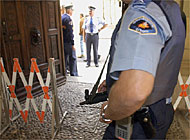Zug killings trigger debate about gun laws

The killing of 14 people by a lone gunman in the Zug cantonal parliament has forced the authorities to reassess the security needs of public buildings and officials, and is likely to spark debate about the nation's gun laws, which are among the most liberal in the world.
The gunman used a standard Swiss army issue assault rifle – a 5,6 mm SIG “Sturmgewehr 90” – to kill his victims, before turning the weapon on himself.
At the same time, another army issue assault rifle was used in a family killing in Lucerne, when a 49-year old Swiss killed his 23-year old stepson before shooting himself.
Both the killers may have been among the 500,000 Swiss men who keep their rifles at home. The population is heavily armed because of Switzerland’s militia system, which requires men above the age of 20 to be ready for a call to service. Soldiers also have the right to keep their rifles after they have been de-mobilised.
According to an army spokesman, Philippe Zahno, there are 320,000 “issue 90” assault rifles currently in circulation in Switzerland. In addition, at least 100,000 of the army’s older “issue 57” assault rifles and several thousand army issue handguns are stored in private households.
Parliament reacts
Parliamentarians have already called for the gun laws to be reviewed in the wake of Thursday’s killings. “We still had the pictures in our minds of the attacks in New York and Washington – and now the blind-rage attack in Zug,” said Social Democrat, Paul Günter, a member of the parliamentary committee on security affairs.
“The threshold of violent aggression seems to be coming down, and in such a situation we have to ask ourselves whether we can still entrust almost every male citizen with a gun.
“The situation is especially alarming with the issue 90 assault rifles, which are lighter and a lot more lethal than the older generation of assault rifles.”
Within the next decade, the first issue 90 assault rifles will come into the private possession of newly demobilised reservists, as were the army’s older rifles.
There are also few controls on the sale of rifles held by ex-servicemen. The law requires that they draw up a sale contract with a buyer, registering his or her name and address. If bequeathed to a family member, army issue rifles can change hands even without that minimal requirement.
The Kosovo conflict
During the 1999 Kosovo conflict, ethnic Albanians were reportedly using Swiss army issue 90 rifles acquired in Switzerland to fight the Serbs.
Switzerland’s gun controls have repeatedly been debated in the past, but to little effect. Supporters of the right of every soldier to keep his rifle at home point to the fact that violent crime is relatively rare in Switzerland despite the liberal gun laws.
But Otto Schoch, a veteran army expert and member of the liberal party, expects the debate will change after Thursday’s massacre in Zug. “The professionals in the ministry of defence will discuss the problem soberly, but I’m less sure that politicians in parliament will be up to the challenge.”
With the country’s gun law currently under revision, left-wing parties are demanding tighter controls. “As a minimum measure, the private sale and the inheriting of army issue hand-guns and rifles must be controlled in the same way that buying a gun in a shop is already,” said Günter.
Switzerland’s gun lobby
After Thursday’s attacks, it’s likely that there will be calls to restrict the keeping of army weapons in private households. But any talk of restrictions would almost certainly run into against stiff opposition from Switzerland’s gun lobby.
Hans-Ruedi Sollberger, president of “Pro Tell”, an association fighting for the right of servicemen to keep army issue guns in their homes, thinks it is much too early to talk about tightening gun controls.
“I don’t want to talk about it before I know whether the killer in Zug procured his assault rifle legally or illegally,” Sollberger told swissinfo.
Pro Tell has said in the past that Switzerland’s liberal gun laws were part and parcel of Swiss “freedom” and “democracy”.
But Sollberger says he is more concerned with the need for continuous training of Switzerland’s reserve militia. “If reservists are not allowed to keep their guns at home, you can forget about the annual shooting course at a range in their town, which is still obligatory at the moment,” he said.
But politicians Günter and Schoch say that, since the end of the Cold War, there is little need for soldiers to keep their weapons at home. “It’s a Cold War concept. When it was feared that the Soviets could reach Switzerland within 48 hours, it was necessary for every Swiss reservist to be able to fight his way to his regiment’s assembly point,” says Günter.
As for the ideological merits of Switzerland’s gun laws, Schoch dismisses them outright: “The thought that we’re in any way lesser ‘Swiss’ if we don’t keep our own assault rifle in a cupboard at home is ridiculous. The independence of our nation doesn’t depend on that.”
by Markus Haefliger

In compliance with the JTI standards
More: SWI swissinfo.ch certified by the Journalism Trust Initiative








You can find an overview of ongoing debates with our journalists here . Please join us!
If you want to start a conversation about a topic raised in this article or want to report factual errors, email us at english@swissinfo.ch.